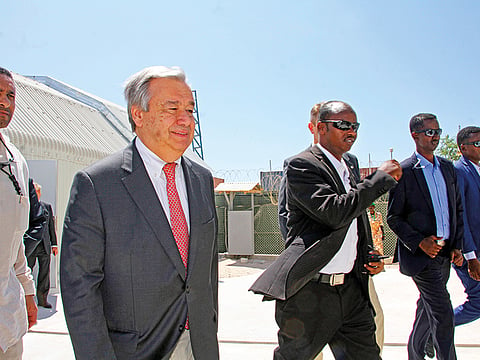Turkish minister says he will speak in Germany despite venue closure
Row escalates between Turkey, Germany over Turkish referendum

ISTANBUL: Turkey’s foreign minister said he would go ahead with a planned rally with Turkish voters in Germany on Tuesday despite local authorities’ closure of the venue, escalating a row between two Nato allies over campaigning for a Turkish referendum.
“I will go. Nobody can stop me,” Foreign Minister Mevlut Cavusoglu told Hurriyet daily after a municipal spokeswoman in Hamburg said the centre the minister planned to speak at had been closed down because it lacked a fire detection system.
Turkish President Tayyip Erdogan accused Berlin on Sunday of “fascist actions” after local authorities in Germany withdrew permission for three other rallies supporting his plans to overhaul Turkey’s constitution and win greater powers. The proposals go to a referendum in April.
Erdogan seeks strong support from Germany’s Turkish community of 1.5 million voters to ensure passage of powers he says are vital for the security of a country facing threats from Islamist and Kurdish militants and still recovering from a failed July coup.
West European officials and rights groups have expressed concern the reforms could endanger democratic control.
Turkish diplomatic sources said a new venue was being sought for Cavusoglu’s meeting.
Post-coup crackdown
“They are trying to cancel all of our programmes by exercising a pressure that is unprecedented in history ... They are pressuring private properties and wedding halls to get contracts cancelled,” Cavusoglu said.
German authorities withdrew permission last week for rallies by Turkish citizens in German cities at which Turkish ministers were to urge a “Yes” vote in next month’s referendum. Berlin says the rallies were cancelled on security grounds.
Erdogan’s comments have stirred anger in Germany where the Turkish leader is already viewed widely with some suspicion for a mass campaign of arrests and dismissals following the July coup. The dispute over the powers threatens to divide the Turkish community there as it is raising passions in Turkey.
Any sign of a spillover of Turkish political tensions would be viewed with concern in Germany and in other west European states, such as Austria and the Netherlands, where in all up to four million Turkish voters live.
Erdogan has no serious rivals in Turkish politics, but he remains a divisive figure, accused by critics of an increasingly intolerant, autocratic style. There is great uncertainty over how Erdogan would react if the referendum produced a “no” vote.



